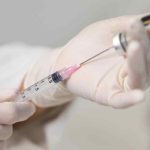The first Pfizer jabs were administered to Australians in late February, but there are concerns some people in that round – which included Prime Minister Scott Morrison – could lose their protection as soon as August.Researchers from the Kirby Institute at the University of NSW predict immunity to Covid-19 from vaccination will wane “significantly” within a year, with the level of neutralising antibodies in the blood dropping over the first few months.“Based on our work and others’ work, we predict that the level of these neutralising antibodies will drop by about 50 per cent over three to four months, and over the next three or four months it may drop by another half,” Senior Research Fellow Deborah Cromer said.“Our modelling suggests that after a year antibodies may well have dropped to a level at which more than half of people would no longer be protected.”Last month Pfizer CEO Albert Bourla warned people who received his company’s shot would “likely” need a third dose between six and 12 months later, and an annual booster thereafter.Ms Cromer said there was not yet a consensus about when vaccine recipients should get their booster.“My gut feeling based on what I have seen is around about a year, but that could be adjusted as more data becomes available,” she said.The issue of vaccinated people effectively losing their immunity is significant because rates of community vaccination will likely be a critical factor in future government decisions such as the reopening of international borders and imposing lockdowns. NSW Premier Gladys Berejiklian has said borders should reopen when the rate of adult vaccination reaches about 83 per cent. Currently less than 3 per cent of the population have received two jabs.Epidemiologist Professor Mary-Louise McLaws from the University of NSW said the pace of Australia’s vaccine rollout had to quicken.“(People who have not been vaccinated) need to start building up urgency in their thinking,” she said. “If the government wants to open up at the end of the year or early next year, if they are over 50 they need to factor in their second dose will happen three months after the first. So they need to work backwards.”Recent modelling by Professor Mikhail Prokopenko from Sydney University’s Centre for Complex Systems showed Australia would not reach herd immunity even with a vaccination rate of 90 per cent, because of the choice to use a lower-efficacy vaccine – Astra Zeneca – for the bulk of the population.“If (our rollout) drags on beyond 12 months, by the time the final fraction of the population gets vaccinated the first ones will lose immunity,” he said. Providing boosters for some people and first doses for others simultaneously would present a “logistical challenge,” Prof Prokopenko said.The assumption that immunity from vaccination would last 12 months could also be “optimistic”, he added.Prof McLaws said some countries such as the UK were already seeing a drop-off in the numbers of people getting a second dose of vaccine. “And in Israel, their experience was low socio-economic groups were slow to even take up the first dose,” she said.“(These people) are financially stressed. They’re not thinking about the greater good, they’re thinking about how to keep their job. When the vaccine hubs and rollouts require us to take time off work, they are the group that can’t afford it. We’re going to have to surely ask employers to enable people to have half a day off to go and get their vaccine, because it’s in everybody’s best interest.”
Powered by WPeMatico




